In Japanese, ishidaki 石抱き, meaning literally "stone hugging," is a torture method in which someone is made do a seiza 正座, i.e. sit on the knees, on a ridged wood block, and then stone blocks are placed on top of their legs, crushing them.
Right: Kurome クロメ
Anime: Akame ga Kill!, アカメが斬る! (Episode 10)
The word is also spelled ishidaki 石抱, without okurigana. Other names include soroban-zeme 算盤責, "abacus torture," and ishi-zeme 石責, "stone torture."
Definition
The ishidaki is a torture method from the Edo 江戸 period (1603–1868), used to make suspects confess their crimes. They'd be forced to kneel on firewood or ridged wood blocks, and stone blocks of around 45 kilograms each would be placed over their legs one after the other, normally while also being hit with a bamboo whip.(石抱 - 精選版 日本国語大辞典)
Let me repeat in case I haven't been clear: this is a TORTURE METHOD. In anime it looks silly because it's used as a joke, but in real life this would be no joke. Four stones and you'd have almost 200 kilograms of weight crushing someone's legs. Brutal.
The ishidaki is also known by the names soroban-zeme and ishi-zeme, "abacus torture" and "stone torture," respectively.
In Japanese, the word for "torture" is goumon 拷問. You can even see it written in the image above.
The suffix ~zeme ~責め is the noun form of semeru 責める, which means "to inflict pain [on someone]." The ~se becomes ~ze due to rendaku 連濁. Not to be confused with the homonym semeru 攻める, which means "to attack" (this is the one used in seme/uke).
- Context: what is your father doing?
- mukashi no goumon kigu de Nagasumi-san wo semetemasu
昔の拷問器具で永澄さんを責めてます
[He] is torturing Nagasumi-san with an old torture tool.- mukashi no
昔の
Of the past. An old [something].
- mukashi no
- chikoku towa ii dokyou da boofura gaa!!
遅刻とはいい度胸だボーフラがァ!!
[You have some nerve] to be late [for school], [huh], [you] maggot!! - gomen nasaaaááí!!
ゴメンなさぁああ゛あ゛い゛!!
[I'm sorry]!!- あ゛ - see dakuten 濁点.
While goumon is used to torture in general, ~zeme is only used to specific ways to inflict pain, i.e. specific tortures, like mizuzeme 水責め, "water torture."
Many such words end up being somebody's fetish in the modern world, like kusuguri-zeme くすぐり責め, "tickle torture," or kotoba-zeme 言葉責め, "word torture," i.e. "verbal abuse."
In any case, the point is that ishi-zeme is torturing someone with stones, which is pretty self-explanatory, but soroban-zeme is torturing someone with an abacus, which isn't as self-explanatory, after all, what does an ABACUS have to do with any of this????
I mean I know some people think math classes are torture, but...
Apparently, it's called soroban-zeme because the ridges on the wood are as sharp as the stones of an abacus(算盤責 - 百科事典マイペディア), so the "abacus" in this word refers to the ridged wood block on which the suspect kneels.
Examples
For reference, some examples of ishidaki in anime:
Left: Kinoshita Hideyoshi 木下秀吉
Center-left: Yoshii Akihisa 吉井明久
Center-right: Tsuchiya Kouta 土屋康太
Right: Himeji Mizuki 姫路瑞希
Rightmost: Shimada Minami 島田美波
Anime: Baka to Test to Shoukanjuu Ni'!, !バカとテストと召喚獣 にっ! (Season 2) (Episode 5)
- Narration:
- ishi-daki, betsumei soroban-zeme tomo iwareru, Edo-jidai no goumon de aru
石抱き、別名算盤責めとも言われる、江戸時代の拷問である
Stone-hugging, also called abacus-torture, is a torture [method] from the Edo period.
Right: Hanazono Yurine 花園ゆりね
Anime: Jashin-chan Dropkick, 邪神ちゃんドロップキック (Episode 5)
- Context: Jashin-chan doesn't have legs, but that doesn't stop Yurine from punishing her with ishidaki.
References
- 石抱 - 精選版 日本国語大辞典 via kotobank.jp, accessed 2021-03-19.
- 算盤責 - 百科事典マイペディア via kotobank.jp, accessed 2021-03-13.
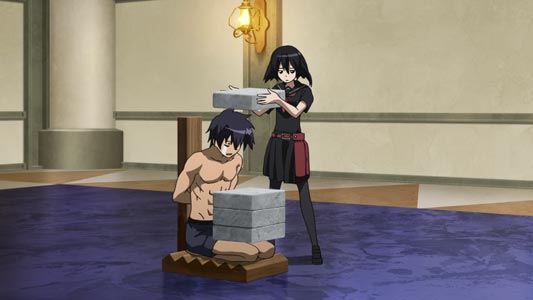
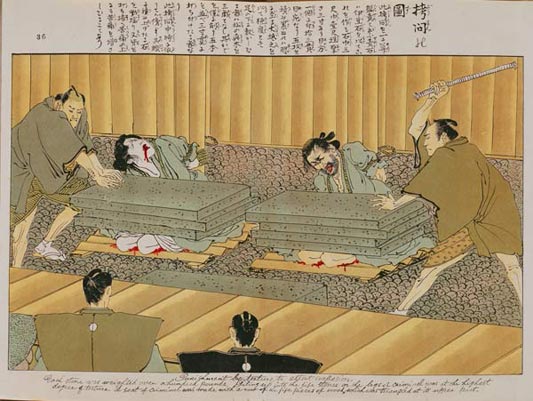
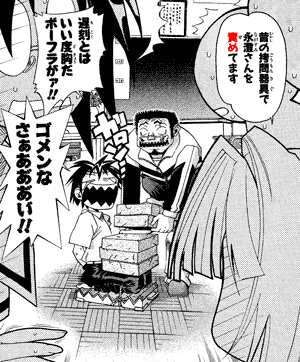
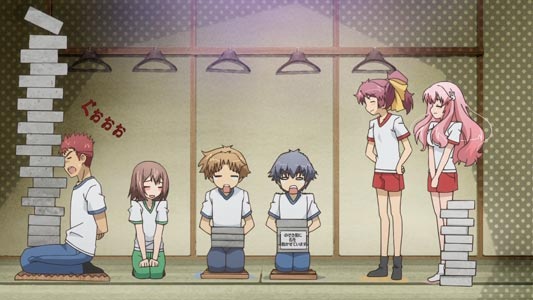
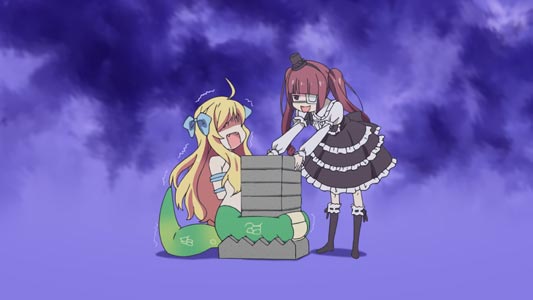
No comments: